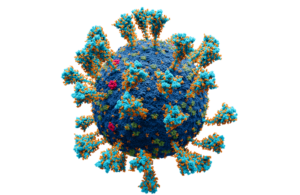
SARS-CoV-2 image courtesy of Wikimedia Commons
A controversial SARS-CoV-2 challenge study involving 36 volunteers found that 47% of individuals did not develop COVID-19. The volunteers were unvaccinated and had no evidence of prior infection with SARS-CoV-2.
The study, whose results were recently published in a pre-print, could potentially point to new vaccine targets or inspire future COVID-19 drug research.
“This study has already generated intriguing insights into the timeline of infection, particularly in the early phase,” said Dr. Doug Brown, chief executive of the British Society for Immunology, in a statement. “In the longer term, the hope is that these findings will now open up a new research avenue to develop a platform that will allow us to speed up the development of new vaccines, antivirals and diagnostics against COVID-19.”
There are a variety of potential explanations why the volunteers, aged 18 to 29, did not develop COVID-19. Protections may include prior infection with similar viruses, genetic factors, viral load or environmental factors.
Four endemic human coronaviruses may offer cross-immunity, although that conclusion has not been established.
The researchers used an intranasal dose of 10 TCID50 wild-type virus (SARS- CoV-2/human/GBR/484861/2020).
Also of note was the finding that 53% of the participants contracted COVID-19 after exposure with the smallest possible dose of 10 TCID50.
Mucosal immunity may also play a significant role in defending against viral infections.
Genetic factors also play a role in influencing the body’s response to the SARS-CoV-2 virus.
Those infected with SARS-CoV-2 in the study received remdesivir, but the study authors found no statistically significant effect on viral load or symptoms in the small cohort involved.